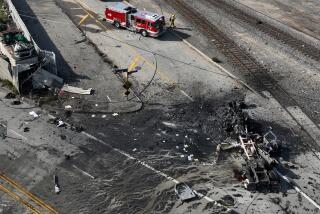Suit Against Tear Gas Maker Is Weak, Experts Say : Middle East: A Sherman Oaks firm is accused of providing Israeli forces with crowd-control technology that may have caused the deaths of eight Palestinians.
A lawsuit charging that a Sherman Oaks company is responsible for the deaths of eight Palestinians exposed to the firm’s tear gas by Israeli security forces is legally weak and may be aimed more at creating public pressure to halt gas sales to Israel, according to legal experts.
The suit, filed last month in federal court in Pittsburgh, Pa., says that TransTechnology and its Pennsylvania manufacturing arm sold CS gas to Israel knowing that their product was being used recklessly by Israeli troops, causing multiple civilian deaths.
Three law professors specializing in tort or international law told The Times that the tear gas opponents have little chance of prevailing in a U.S. court.
For one thing, they said, a judge is likely to rule that the suit should be tried in Israel or the territories it occupies, where the victims resided and where the gas was used and the decisions to use it were made.
“For an American court to get involved in this kind of foreign, international dispute strikes me as very unlikely,” said Gary Schwartz, a professor at UCLA Law School.
The scholars pointed to an American judge who turned back a lawsuit filed in the United States against Union Carbide Corp. after the 1984 pesticide leak at its plant in Bhopal, India, which killed 3,330 people. The judge ruled that the suit should be tried in the Indian courts, they said.
John Fleming, a professor at UC Berkeley’s Boalt Hall law school, also cited a failed lawsuit against a manufacturer of “Saturday Night Special” revolvers, cheaply made and inaccurate weapons commonly used in assaults and robberies.
That action, filed by people who were shot with such weapons, argued that the handguns could be used only for harming people and that the maker should be held responsible for injuries or deaths caused by the revolvers.
The court held that the manufacturer was not liable, Fleming said, adding that the TransTechnology case is “not as strong” as the revolver suit.
Fleming said the suit’s backers are “trying to make a statement, which has my sympathy. But that doesn’t mean they’ll win in court or even get into court, for that matter.”
Beth Stephens, a staff attorney with the Center for Constitutional Rights, the New York-based human-rights group that filed the suit, denied that the lawsuit is simply a public relations maneuver and said she believes the plaintiffs have a good chance of winning.
Stephens said the suit cannot be tried in the Israeli-occupied areas, where the plaintiffs lived, because the court system there “is virtually non-functioning.”
She added that although some people have lost suits against handgun manufacturers, others have won.
In 1989, she said, a New York jury awarded $2.4 million to a widow who sued K mart in Niagara Falls for selling a shotgun to a drunk man who, hours later, shot her husband.
The tear gas lawsuit is the latest volley by critics of Israel against TransTechnology, the biggest tear gas maker in the United States. The firm supplied much of the gas that has been used by Israeli forces in their effort to quell the intifada, an insurgency among Palestinians in Israeli-occupied territories that erupted in late 1987.
In 1988, TransTechnology’s factory in Saltsburg, Pa., became the target of demonstrations by pro-Arab groups after allegations that numerous Palestinians had died as a result of the gas being fired into hospitals, mosques and other enclosed places in the West Bank and Gaza Strip.
In response to the protests, TransTechnology suspended shipments of tear gas to Israel for several months in 1988. However, the shipments were resumed after the Israeli government gave assurances that it was being used properly.
The lawsuit seeks punitive and compensatory damages on behalf of the eight Palestinians.
Stephens said that although tear gas is commonly used as a crowd-control measure by police around the world, it is far more dangerous than most people realize. It can cause fatal heart and respiratory problems, and its long-term health effects have never been studied, she said.
Among the alleged victims named in the lawsuit is a 47-year-old Palestinian father of eight who died after walking through a cloud of gas near his home. Another is a 68-year-old Palestinian woman who died after inhaling gas from a canister that landed in an enclosed porch outside a window of her Jerusalem-area home.
According to a report by the U.S. General Accounting Office, 366 Palestinians were killed in 1988 as a result of the intifada . The report said at least four deaths were attributable to tear gas fired by Israeli forces into enclosed areas.
The report quoted State Department officials who concluded that Israeli troops “occasionally used tear gas improperly and carelessly by employing it in enclosed areas but that this practice does not appear to be widespread.”
The GAO added that an American group, Physicians for Human Rights, had conducted a fact-finding trip in Israeli-occupied areas in 1988, but could not substantiate widespread rumors among Palestinians that tear gas had caused numerous miscarriages.
Miscarriages could have been caused by the “stress and excitement” of being present during violent confrontations between Palestinians and Israelis, the report said.
A spokeswoman for the Israeli Consulate in Los Angeles had no immediate comment on the lawsuit. In the past, Israeli officials have said that complaints of tear gas abuse have been exaggerated.
However, they have acknowledged that tear gas has caused deaths in isolated incidents. In 1989, the Israeli Ministry of Justice said soldiers had been disciplined for improper use of tear gas.
A TransTechnology spokeswoman said the company’s policy was not to comment on pending litigation.
In the past, company officials have said that while they are aware that innocent civilians can be harmed by the gas, the number and severity of injuries could be far worse if security forces did not have the gas and resorted to deadlier methods--such as shooting into crowds--to control demonstrations.
Stephens of the Center for Constitutional Rights said TransTechnology knew Israeli forces were misusing tear gas because pro-Palestinian groups mailed the firm several reports detailing the alleged abuses, including a 1988 Amnesty International report that said 40 Palestinians died after tear gas exposure.
The human rights group charged that Israeli Defense Force soldiers fired CS into schools, hospitals and other enclosed places, making it more hazardous than if used in open air.
The state of Israel was not named as a defendant, Stephens said, because of the difficulty in suing a foreign government and because the suit’s backers want to send a message to U.S. manufacturers who sell unsafe products in foreign countries.
She said the suit’s sponsors decided against naming the U.S. State Department, which must approve shipments of tear gas to Israel, for similar reasons. According to the GAO report, the State Department approved export licenses for $6.5 million worth of tear gas guns, grenades and cartridges to Israel in 1987 and 1988.
Under U.S. law, the State Department can block shipments of military and law enforcement equipment to countries engaged in “a consistent pattern of gross violations of internationally recognized human rights,” such as the use of torture and prolonged detention without charges or trial.
A department spokesman said the agency has not blocked any tear gas shipments to Israel, believing that the gas generally has been used properly by that country.
More to Read
Sign up for Essential California
The most important California stories and recommendations in your inbox every morning.
You may occasionally receive promotional content from the Los Angeles Times.










